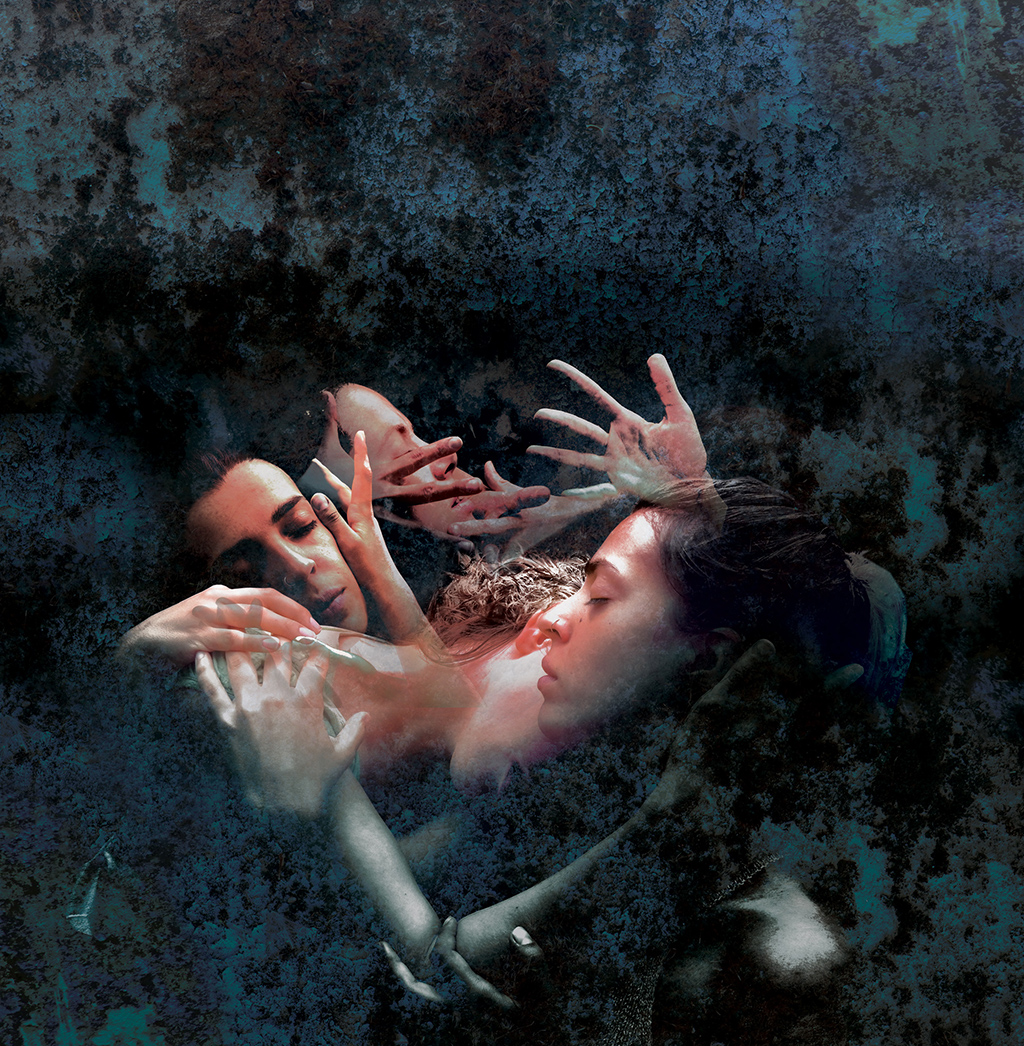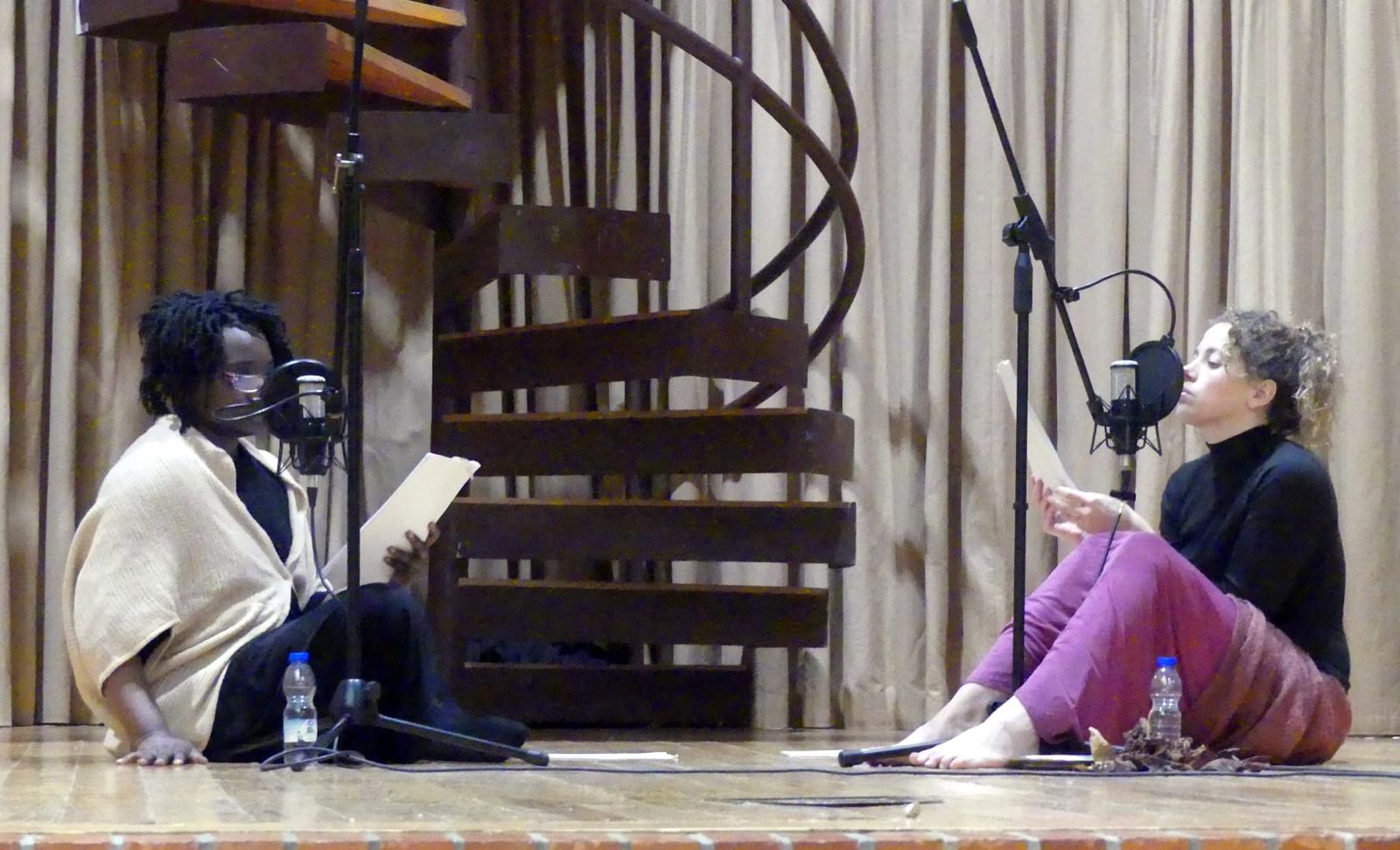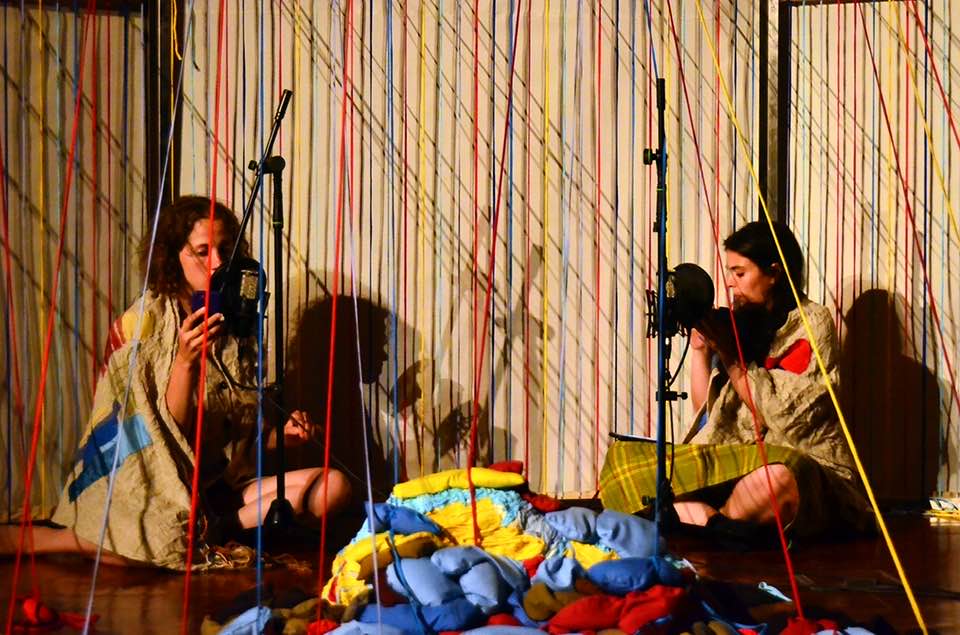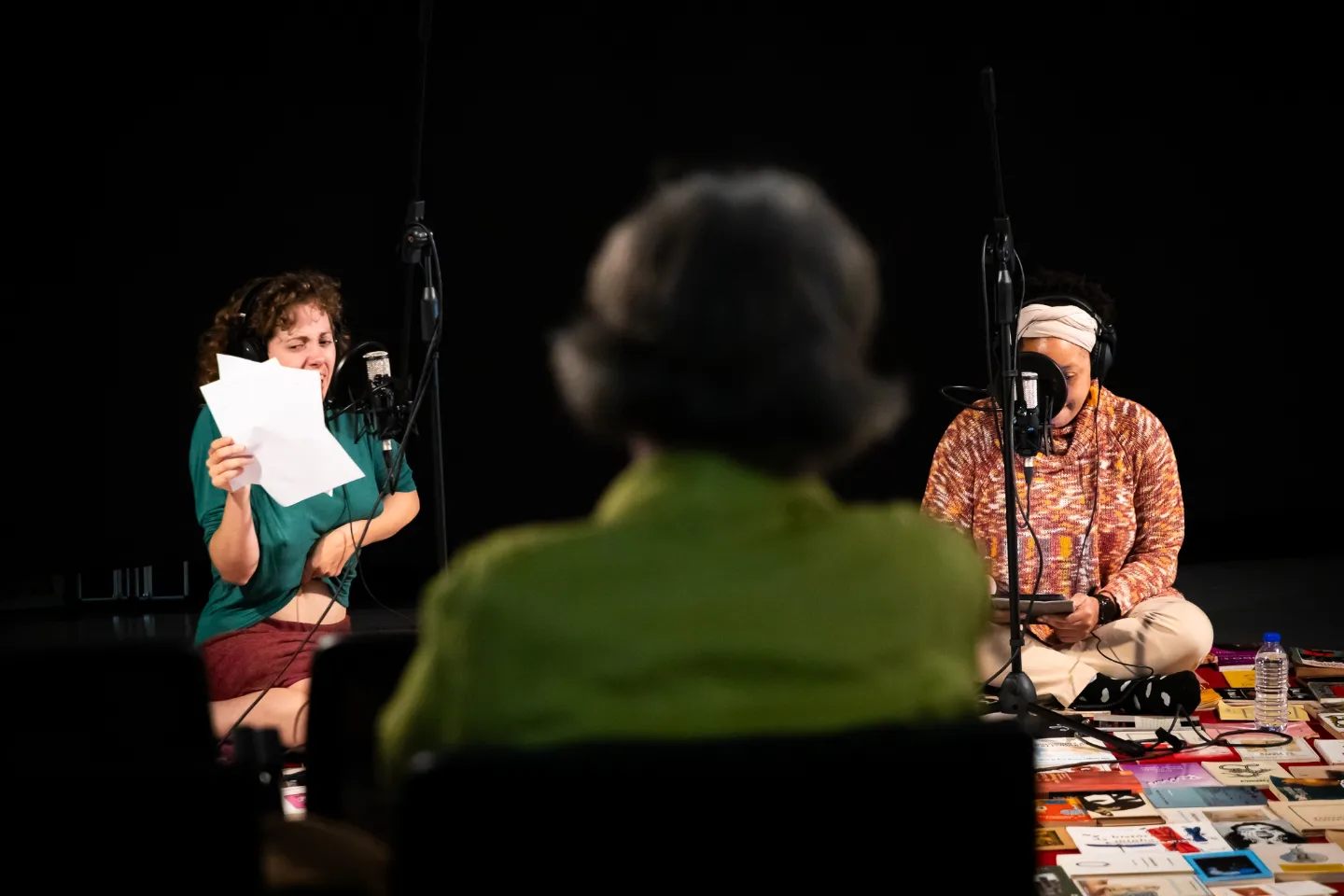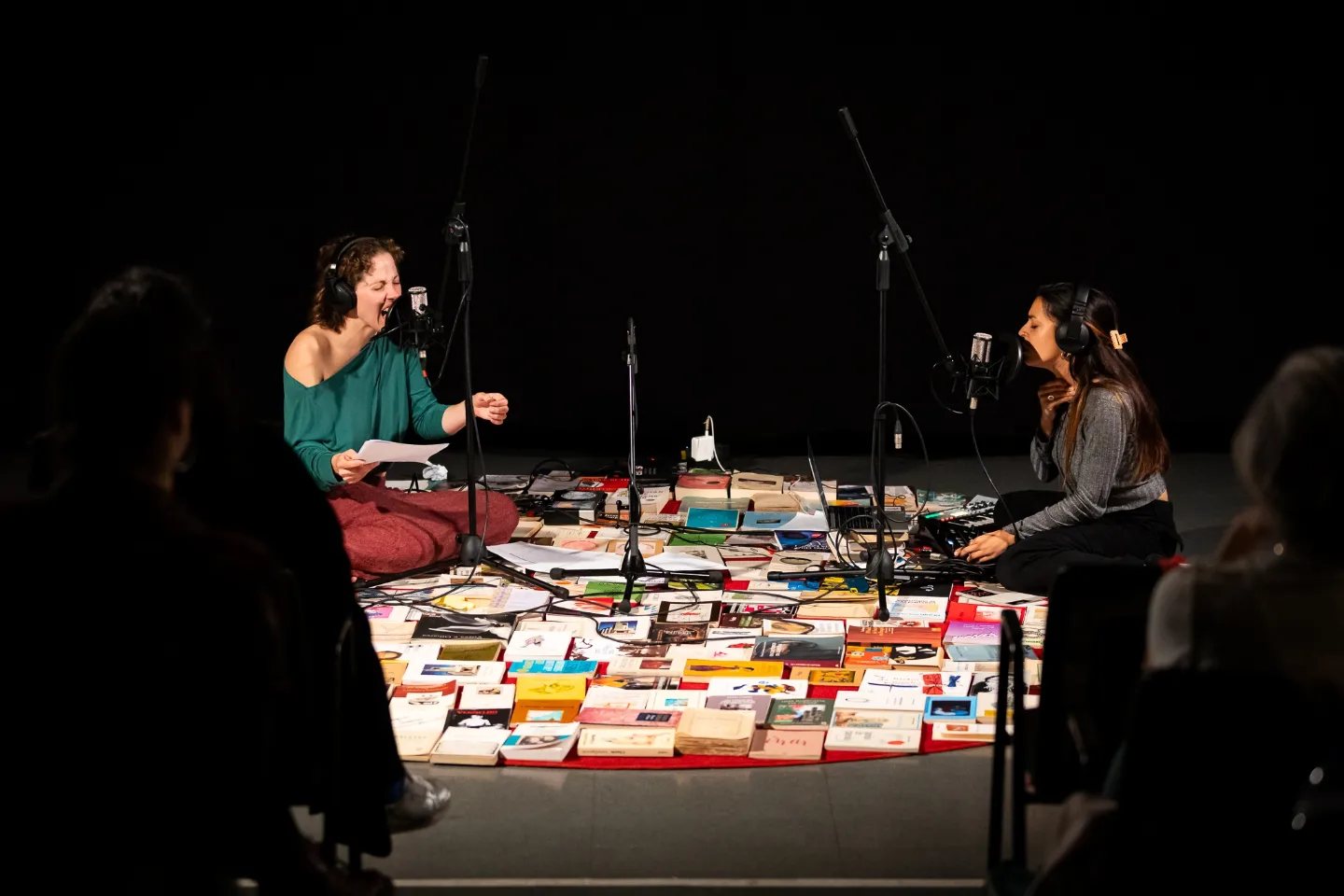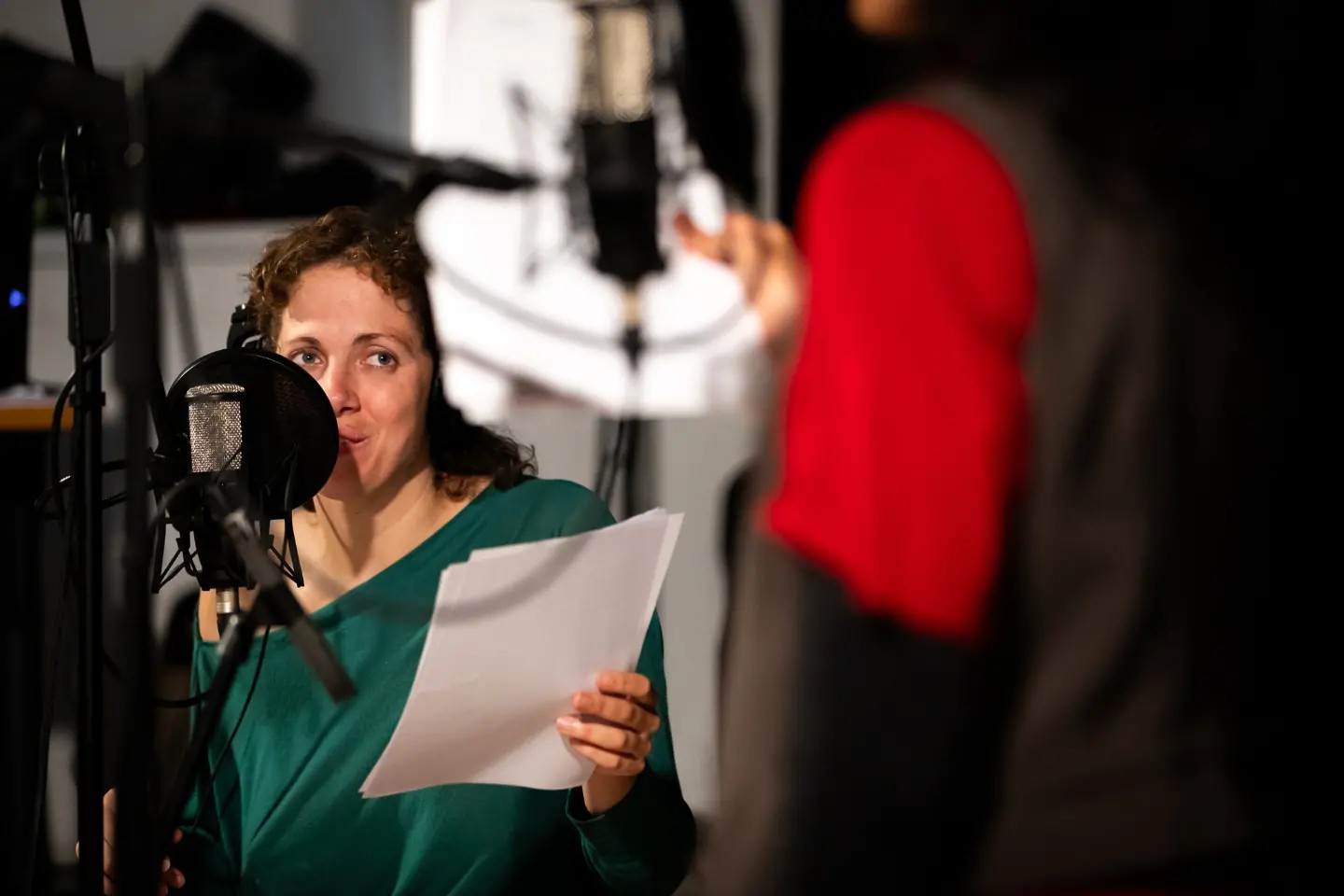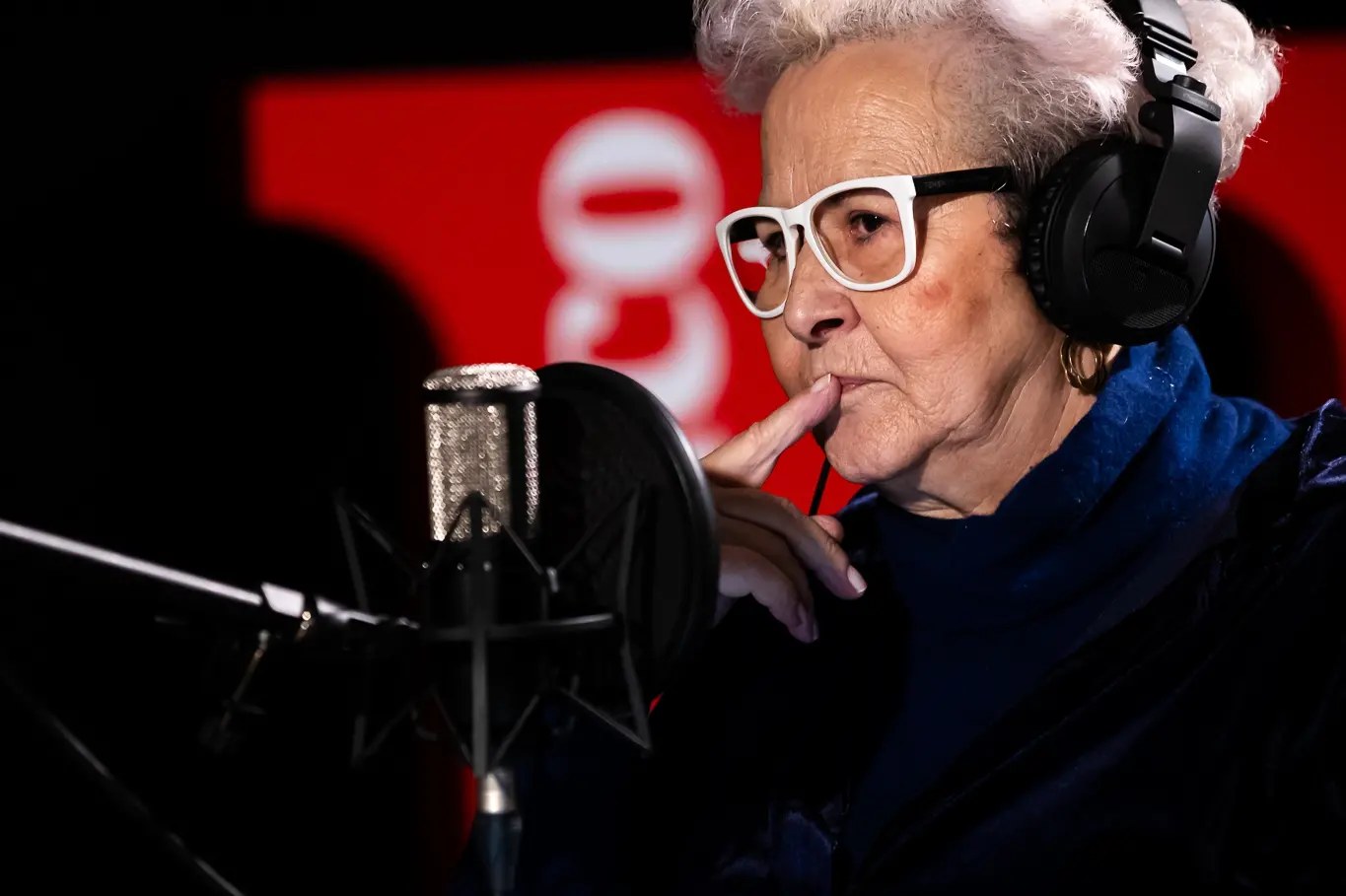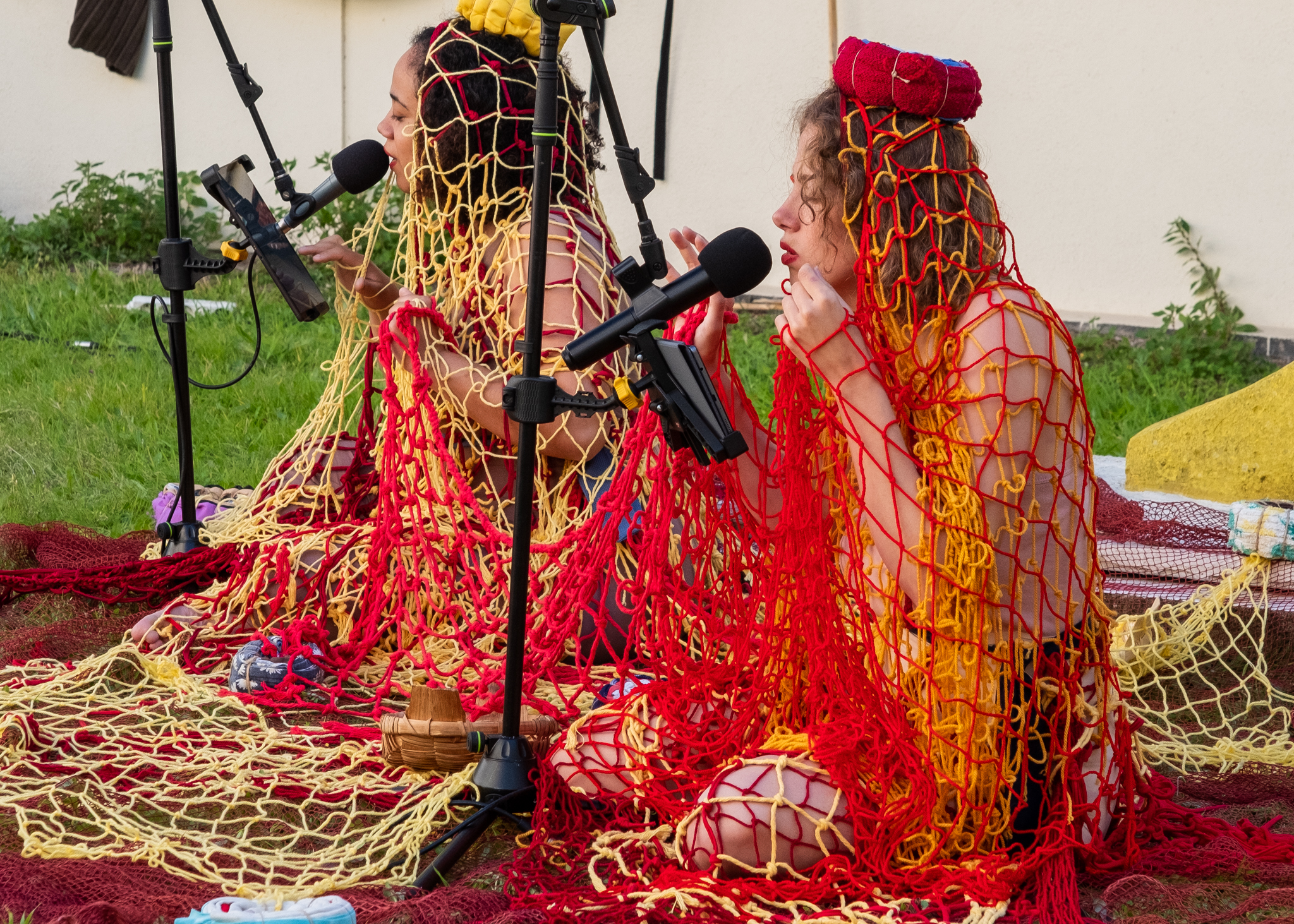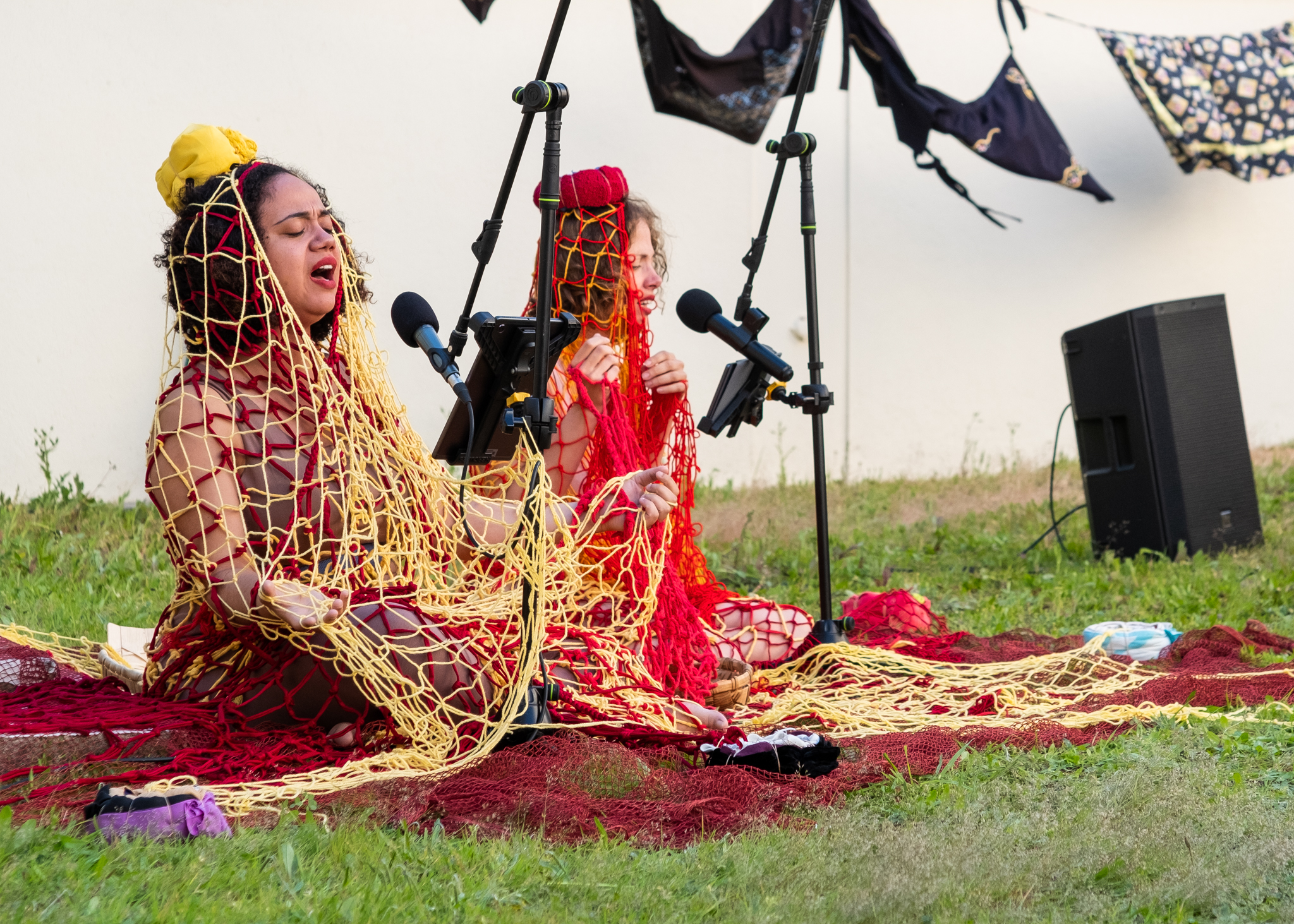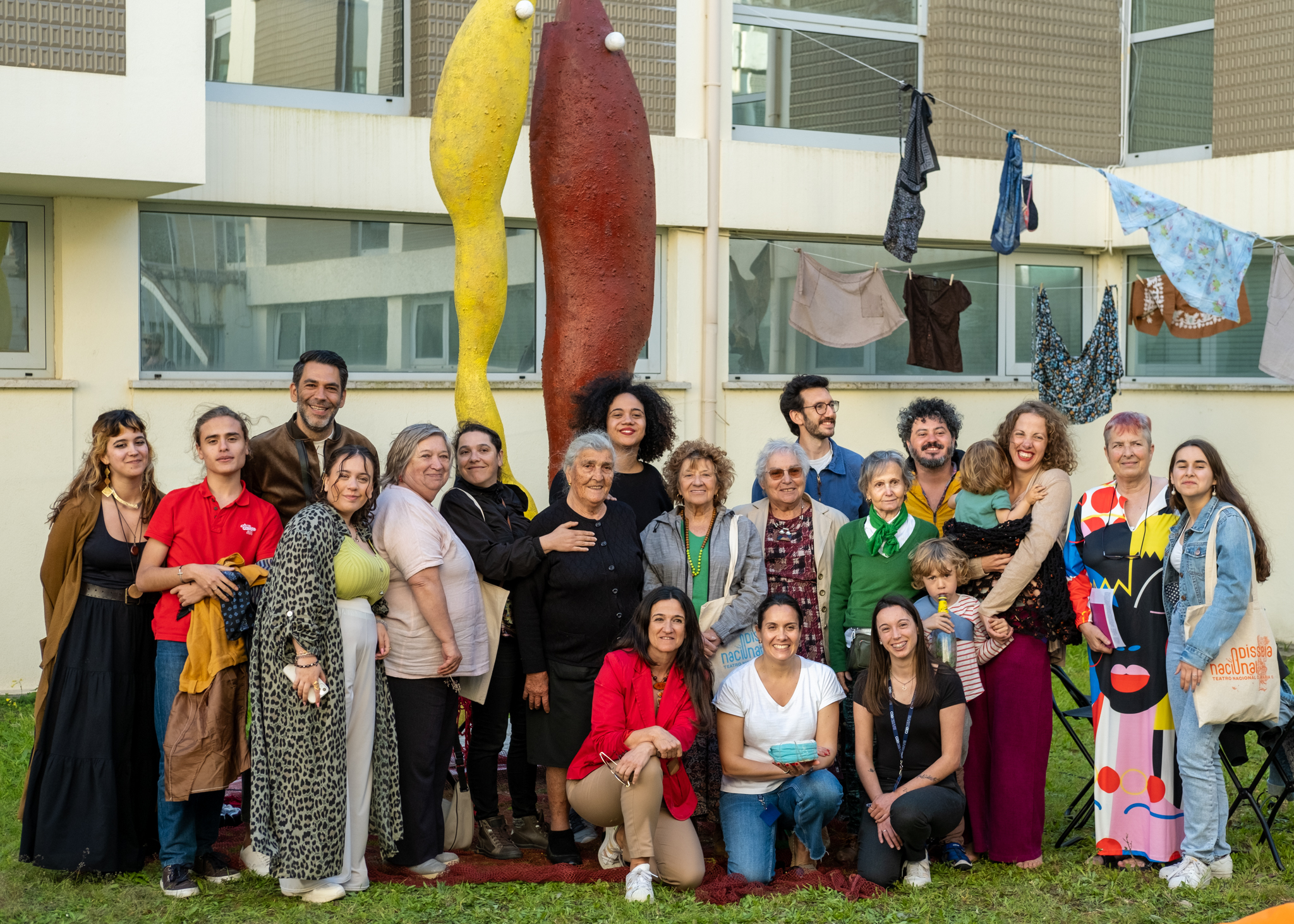A Thousand and One Nights
Synopsis
A Thousand and One Nights is an experiment in voice and words that makes the voices of two women symbiotic every night: together, these two voices are Xerazade, telling the stories of women who wrote in the 20th century: from diaries to poems, lenga-lengas to love letters; from voting declarations to embroidered handkerchiefs, from union minutes to essays.
Over the last two years, the UmColetivo team, based in Portalegre, has been collecting stories and writings from public libraries, artist residencies, archives and personal collections. It's a task that hasn't ended and won't end soon: it's travelling in the backpack with which the team travels the country, in a project that was inspired by the work of Maria Lamas.
Each evening, we share an extract from a woman's work and talk briefly about her biography, trying to open up avenues for new readings, new studies and, perhaps, new editions.
Technical sheet
Artistic Direction - Cátia Terrinca
Interpretation:
1st grade | Ana Lua Caiano, Andresa Olímpio, Cátia Terrinca, Elizabeth Pinard, Mariana Bragada
2nd grade | Ana Sofia Nunes, Cheila Lima, Cátia Vieira, Fernanda Neves, Sara Brandão
Dramaturgy - Ricardo Boléo
Research - Cátia Terrinca and Raquel Pedro
Capturing and Mixing - Ivo Reis and João P. Nunes
Mastering - Ivo Reis
Presentation history
The first session sings and talks about women through texts and songs passed down by word of mouth, offering a journey through the country of voices. It starts in Alegrete - a village in the Serra de S. Mamede (Portalegre) - and sails along the Alto Douro, Sousel and Arouca. Tones and accents are questioned, love and labour are joked about, and we also sing. Because those who sing, as we know, have their woes taken away.
When we write for children, are we also writing about our childhoods? Through texts by Maria Regina Louro, Zulmira Oliva, Vitorina Agostinho, Celina Pereira, Deolinda da Conceição and Matilde Rosa Araújo, children's thoughts on the world are embraced and we listen to and reflect on the day-to-day lives of women, the nights of girls cuddled up with dolls, the dawns of women cuddled up with their children, the women who, without anyone publicly admiring them, clean and dream the world.
Based on the book of the same name, launched by URAP - União de Resistentes Antifascistas Portugueses (Union of Portuguese Anti-Fascist Resisters), the collection of letters by Ivone Dias Lourenço, Maria Luísa Costa Dias, Aida da Conceição Paula, Maria Alda Nogueira and Fernanda Paiva Tomás is analysed, as well as testimonies that provide a glimpse of female and feminist resistance to the regime that haunted Portugal between 1933 and 1974.
Judith Teixeira saw her work Decay to be burnt because of the freedom with which she wrote about her body and the bodies she loved. Based on her, this session traces a poetics about the eroticism of the body, for which it also calls on the words of Beatriz Rodrigues Barbosa, Maria Helena Barreiro, Fiama Hasse Pais Brandão and Maria Teresa Horta. Between whisper and shout, we talk body to body, eye to eye, about love.
Maria Lamas wrote one of the feminist works recognised as fundamental to the history of the 20th century: Women of My Country. This session explores the autobiographical universe of four other women besides Maria Lamas: Natércia Freire, Maria Archer, Fernanda de Castro and Maria Velho da Costa, pioneers, revolutionaries, sharpshooters who provide precious reading tools for travelling back in time. More than an immediate reflection on who we were as women in the last century, it is also important to reflect on who we are - and with what freedom to be and to be today, in the 21st century.
Artistic Direction - Cátia Terrinca
Dramaturgy - Ricardo Boléo
Research - Cátia Terrinca and Raquel Pedro
Interpretation - Cátia Terrinca and Mariana Bragada
Lighting - João P. Nunes
Sound design - Mariana Bragada
Design - David Costa
Support - Antenna 2
Production - A COLLECTIVE
Guest performer - Patrícia Andrade
Guest performer - Ana Lua Caiano
From soft peace to nocturnal drunkenness, Santos Rocha Municipal Museum, Figueira da Foz, April 2023
Creation - A Collective
Dramaturgy - Ricardo Boléo with Cátia Terrinca, Cheila de Lima
Research - Raquel Hilário Pedro
Light design - João P. Nunes
Costumes and stage space - Ana Luís, Luís Costa, Matilde Brito (students from Escola António Arroio) coordinated by Raquel Hilário Pedro
Design - David Costa
Sound, audio recording and mixing - Ivo Reis, João P. Nunes
Stage space - A COLLECTIVE
Production - A COLLECTIVE
Production support - Alentejo Regional Directorate of Culture
Co-production - D. Maria II National Theatre in partnership with the Calouste Gulbenkian Foundation, Antena 2, Materiais Diversos and CAE Portalegre
Guest performer - Elizabeth Pinard
Guest performer - Patrícia Andrade
Guest performer - Ana Mónica
Here, without water or land, the women would cross the mountains at night to wash their clothes elsewhere. They whistled to keep the men away, they dreamed of revolution to get closer to freedom. Women who dared to leave Alcanena to see beyond their glasses. Women who return in the poems and stories they write to give birth to their skin. These stories, which we tell today in our own voices, we harvested a little while ago in their voices and lyrics. Women whom time has not allowed to be firefighters or nurses, and yet they are still saving the world.
A Thousand and One Nights: Saia da Cabeça de Pedra is a radio theatre piece recorded live in Alcanena, based on the life and work of women from various generations, who were invited to reveal their writing activity and share the stories and contexts in which they developed it. After an artistic residency from 1 to 10 September and today's informal public presentation, the radio theatre piece created from these voices returns to the Alcanena Municipal Library in the form of a sound installation. On 6 October, the date of the inauguration, there will be a conversation with some of these authors and the artistic team that developed the project and, throughout the festival, it will be possible to immerse yourself in these universes that are as unique as they are little known.
Testimonials - Aida Costa, Aldina Marques, Alzira Bento, Fernanda Costa, Hermínia Caetano, Maria Manuela Carvalho, Maria Teresa Félix, Natércia Maia and Zulmira Bento texts by Alzira Bento, Hermínia Marta Caetano, Manuela Baptista, Maria Manuela Mateus Rodrigues, Maria Nazaré Vieira Nico Lopes, Maria Lucília Moita, Maria Zabeleta, Odete Cláudio, Teresa Maria Santos Félix and Zulmira Bento
Interpretation - Cátia Terrinca, Andresa Olímpio
Dramaturgy - Ricardo Boléo from literary material collected in Alcanena
Research - Cátia Terrinca and Raquel Pedro
Set design and construction - Ana Luís Pires, Luís Costa
Sound capture and mixing - João P. Nunes
Sound editing and mastering - Ivo Reis
Scene photography - Estelle Valente
Creation and production - A COLLECTIVE
Guest performer - Sara Brandão


